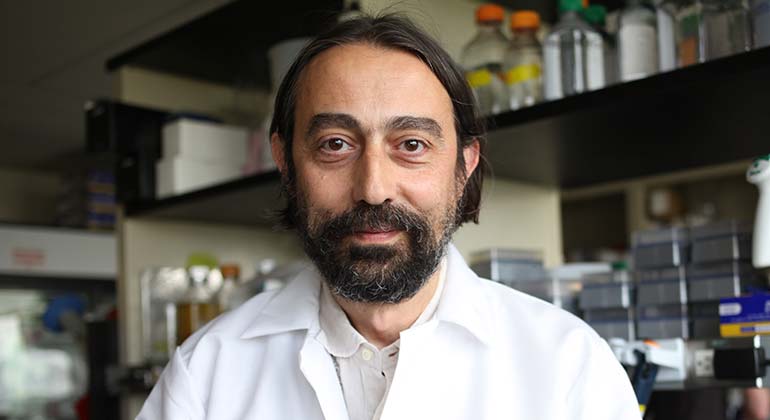Leader in Global Health and Emerging Pathogens at Mount Sinai Elected to the National Academy of Sciences
Highest honor recognizing outstanding contributions to science

Adolfo García-Sastre, PhD, Director of the Global Health and Emerging Pathogens Institute, and the Irene and Dr. Arthur M. Fishberg Professor of Microbiology and Medicine (Infectious Diseases) at the Icahn School of Medicine at Mount Sinai, has been elected to the National Academy of Sciences (NAS), an honor signifying that a researcher has made outstanding contributions to the field. With his election, Mount Sinai has three current faculty members in the National Academy of Sciences: Dr. García-Sastre; Maria Iandolo New, MD, Professor of Pediatrics, Medicine (Endocrinology), and Genetic and Genomic Sciences; and Peter Palese, PhD, Horace W. Goldsmith Professor and Chair of Microbiology, and Professor of Medicine (Infectious Diseases).
For more than 20 years, Dr. García-Sastre has researched the molecular biology of influenza viruses and several other negative-strand RNA viruses. His landmark contributions include the successful development of reverse genetics techniques allowing the recreation of the extinct pandemic influenza virus of 1918 from recombinant DNA.
“It is with great honor that I congratulate my colleague Dr. Adolfo García-Sastre, who has made great contributes to science,” said Dr. Palese. “His work has enabled the reconstruction of the extinct 1918 influenza virus, has led to the identification of the biological role of the influenza virus NS1 protein as an interferon antagonist, and has informed continued efforts to develop a universal influenza virus vaccine. This is a great achievement and we are excited to see him continue this important work in the future.”
“Dr. Garcia-Sastre’s research represents the frontier of his field,” says Dennis S. Charney, MD, the Anne and Joel Ehrenkranz Dean of the Icahn School of Medicine at Mount Sinai. “The discoveries made by him and others at Mount Sinai will result in powerful new means to combat deadly viruses that affect millions of people and lay the groundwork for discovery of viruses yet known. This distinguished achievement is well-deserved.”
Dr. Garcia-Sastre has researched the generation and evaluation of several vaccine candidates against different diseases, including influenza, malaria, AIDS, and cancer; and identified the biological role of the non-structural protein NS1 of the influenza virus during infection. His studies provided the first description and molecular analysis of a viral-encoded peptide among negative strand RNA viruses, which led to a generation of influenza viruses that may prove to be optimal live virus vaccines against influenza. His work has resulted in more than 500 scientific publications and reviews, and his translational efforts include more than 50 patents and the development of viral vaccines in the veterinary and human fields.
Dr. García-Sastre also serves as Director of the Center for Research on Influenza Pathogenesis, one of five National Institutes of Health Centers of Excellence for Influenza Research and Surveillance.
About the Mount Sinai Health System
Mount Sinai Health System is one of the largest academic medical systems in the New York metro area, with 48,000 employees working across seven hospitals, more than 400 outpatient practices, more than 600 research and clinical labs, a school of nursing, and a leading school of medicine and graduate education. Mount Sinai advances health for all people, everywhere, by taking on the most complex health care challenges of our time—discovering and applying new scientific learning and knowledge; developing safer, more effective treatments; educating the next generation of medical leaders and innovators; and supporting local communities by delivering high-quality care to all who need it.
Through the integration of its hospitals, labs, and schools, Mount Sinai offers comprehensive health care solutions from birth through geriatrics, leveraging innovative approaches such as artificial intelligence and informatics while keeping patients’ medical and emotional needs at the center of all treatment. The Health System includes approximately 9,000 primary and specialty care physicians and 10 free-standing joint-venture centers throughout the five boroughs of New York City, Westchester, Long Island, and Florida. Hospitals within the System are consistently ranked by Newsweek’s® “The World’s Best Smart Hospitals, Best in State Hospitals, World Best Hospitals and Best Specialty Hospitals” and by U.S. News & World Report's® “Best Hospitals” and “Best Children’s Hospitals.” The Mount Sinai Hospital is on the U.S. News & World Report® “Best Hospitals” Honor Roll for 2025-2026.
For more information, visit https://www.mountsinai.org or find Mount Sinai on Facebook, Instagram, LinkedIn, X, and YouTube.